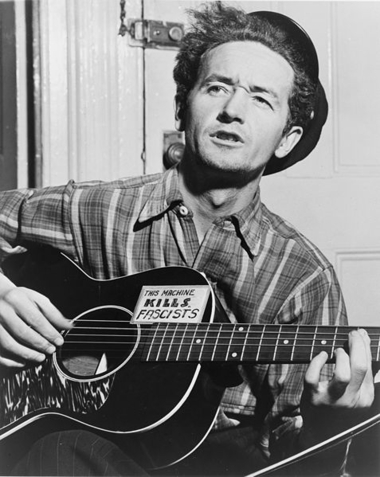Woody Guthrie's 'Deportees' get their names back

GINNIE GRAHAM, Tulsa World
TULSA, Okla. (AP) — Woody Guthrie's deportees are finally getting their names back.
The Oklahoma balladeer wrote the poignant "Deportee (Plane Wreck at Los Gatos)" after reading newspaper accounts in 1948 about a crash that killed 28 Mexican migrants and four Americans.
The reports called them "deportees" and, more importantly, never published their names.
Only the names of the four Americans who died were published.
Even at the burial site in the Holy Cross Cemetery in Fresno, Calif., there is one grave with no names.
Author Tim Z. Hernandez, son of Mexican migrant workers and native of the Los Gatos area, has been researching the victims for an upcoming book and raising money for a memorial.
"The most jarring part of this whole situation is that even 65 years later no one has put the names on a headstone," Hernandez said. "Someone had to have known them."
This isn't about politics.
"This particular incident, even as Woody Guthrie saw it, is less about the immigration debate and more about humanity," Hernandez said. "People, especially in death, deserve their names. That crosses all color lines and ideas."
Setting history to music: Tulsa has been celebrating Guthrie's influence with the opening of a center in downtown.
The Okemah native used his guitar as a weapon to fight against the inhumane and unfair treatment of the poor and oppressed.
Guthrie illustrates this degradation in a poem written within months of the fatal accident. He assigned fictional names.
"Goodbye to my Juan, goodbye, Rosalita; Adios mis amigos, Jesus y Maria; You won't have your names when you ride the big airplane; All they will call you will be deportees."
Colorado teacher Martin Hoffman, who was part of a folk music group, set the poem to music about 10 years later, and singer Pete Seeger made it famous.
The song has been recorded by a diverse group of artists including The Kingston Trio, Bob Dylan, Dolly Parton, Hoyt Axton, Concrete Blonde and Bruce Springsteen.
"There is an opportunity here to show there are human beings behind these names," Hernandez said. "There are stories and lives. This is about finding out who they are."
'History is in sharing': Hernandez decided on this project while looking through old newspapers for his current book, "Mañana Means Heaven," at the Fresno County Library in California.
That book is about Bea Franco, who is "Terry," the "cutest little Mexican girl," in Jack Kerouac's "On the Road."
To get into the era's mindset, Hernandez was listening and studying '30s and '40s music, including Guthrie's work, when he came across a 1948 headline.
"I realized pretty quickly it was the same accident Woody Guthrie was writing about," he said.
Originally, Hernandez was going to write a novel. That quickly changed as the facts emerged.
He found a manifest list online but the names were not correct, based on his knowledge of Mexican surnames and misspellings.
A trip to the cemetery and information from California's records agencies helped fill in blanks.
He has interviewed eyewitnesses and spoken with the pilot's family, and is tracking down descendants of the workers.
Hernandez was given the first recording of the song by the family of Hoffman, who made it in his living room.
"There is a beautiful thing coming from the telling of this story," he said. "This story existed in the folk music community for 50 to 60 years now. In the Latino community, it never existed as a piece of our history. I grew up here and never knew about it.
"Even if you might have heard the song, you didn't know it's a true story and didn't realize it happened here. History is in sharing this story. We can take ownership of this story. Latino students and Mexican Americans will know this is part of our community."
Time catches up: The director of the Holy Cross Cemetery has taken an active role.
"He knew about the history of the song but did not know that it was part of the cemetery's history," Hernandez said.
Fundraisers are being held for memorials at the crash site and cemetery, which will feature leaves inscribed with the names.
That design is inspired by Guthrie's words:
"Is this the best way we can grow our big orchards? Is this the best way we can grow our good fruit? To fall like dry leaves to rot on my topsoil; And be called by no name except deportees?"
It took decades for Oklahomans to embrace Woody Guthrie. It may take decades to unravel the wealth of history contained in his writings.
"It seems time has to catch up to all of this," he said. "I knew about Woody Guthrie in terms of the patriotic Woody Guthrie. I never knew he had any connection to the world I was from at all and connection to my people."
___
Information from: Tulsa World, http://www.tulsaworld.com
Copyright 2013 The Associated Press.





